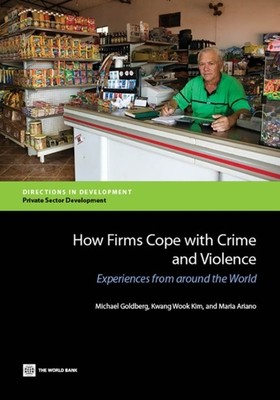
- We will send in 10–14 business days.
- Author: Michael Goldberg
- Publisher: World Bank Publications
- Year: 2014
- Pages: 88
- ISBN-10: 1464801010
- ISBN-13: 9781464801013
- Format: 17.8 x 25.4 x 0.6 cm, softcover
- Language: English
- SAVE -10% with code: EXTRA
Reviews
Description
Crime and violence inflict high costs on the private sector--costs that are rising globally, according to the World Bank's Enterprise Surveys, discussions with chambers and associations, and the Bank's Country Partnership Strategies, which reference the losses in terms of gross domestic product (GDP). In Latin America and the Caribbean, for example, losses due to crime and violence have been estimated at 9 percent of GDP in Honduras, 7.7 percent in El Salvador, and 3.6 percent in Costa Rica. In sectors such as clothing assembly, international purchasers can shift know-how and capital quickly to less violent destinations, while other sectors such as extractive industries are more likely to stay despite rising violence. Behind the statistics are human costs: lost jobs; shifting of businesses' working capital from productive uses to security firms; and an increase in contraband, fraud and corruption, and "rule of law" issues. In this book, original case studies from Brazil, Colombia, Jamaica, Mexico, Nepal, and Rwanda illustrate the specific challenges to businesses and the coping mechanisms that firms and groups of firms have used successfully against crime and violence. The book's findings have implications for the private sector, governments, and the World Bank's efforts to support both under difficult circumstances.
EXTRA 10 % discount with code: EXTRA
The promotion ends in 19d.23:48:09
The discount code is valid when purchasing from 10 €. Discounts do not stack.
- Author: Michael Goldberg
- Publisher: World Bank Publications
- Year: 2014
- Pages: 88
- ISBN-10: 1464801010
- ISBN-13: 9781464801013
- Format: 17.8 x 25.4 x 0.6 cm, softcover
- Language: English English
Crime and violence inflict high costs on the private sector--costs that are rising globally, according to the World Bank's Enterprise Surveys, discussions with chambers and associations, and the Bank's Country Partnership Strategies, which reference the losses in terms of gross domestic product (GDP). In Latin America and the Caribbean, for example, losses due to crime and violence have been estimated at 9 percent of GDP in Honduras, 7.7 percent in El Salvador, and 3.6 percent in Costa Rica. In sectors such as clothing assembly, international purchasers can shift know-how and capital quickly to less violent destinations, while other sectors such as extractive industries are more likely to stay despite rising violence. Behind the statistics are human costs: lost jobs; shifting of businesses' working capital from productive uses to security firms; and an increase in contraband, fraud and corruption, and "rule of law" issues. In this book, original case studies from Brazil, Colombia, Jamaica, Mexico, Nepal, and Rwanda illustrate the specific challenges to businesses and the coping mechanisms that firms and groups of firms have used successfully against crime and violence. The book's findings have implications for the private sector, governments, and the World Bank's efforts to support both under difficult circumstances.


Reviews